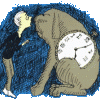-
Posts
766 -
Joined
-
Last visited
-
Days Won
2
Reputation Activity
-
 maelia8 got a reaction from DGrayson in How important are friends/social life in grad school?
maelia8 got a reaction from DGrayson in How important are friends/social life in grad school?
I absolutely agree with this. I just passed my quals, but three people in my cohort are dropping out (two decided in the last two months not to take the exam, while the third took it but already wanted to leave before he took it). The one thing that these three people have in common is a strong disconnect with other members of the grad student community. They never attended colloquia or stuck around for wine and cheese afterwards, didn't attend meetings of the History Grad Association, and didn't talk to other students about the pitfalls of choosing your orals committee, taking classes in x outside department with x professor (who other grad students know). Two of them had very strong social lives outside of grad school, and the third isolated himself and really developed no connections in the city at all.
As a result, all three of these folks missed out on very useful information, or struggled needlessly to plan or prepare things that would have been much easier if they had been in the loop. Although your major professor knows many things, other grad students are often very valuable sources of information when it comes to navigating university bureaucracy, meeting deadlines for things like funding applications and teaching certifications, and telling you about how to navigate setting up committees or informing you where to go for more information. If you don't take the initiative to get to know people in the first year, you could find yourself shut out of a valuable network (especially involving graduate students in years above you who know the system and are often happy to give new hands advice). I have no doubt that in the case of these three who departed, feelings of confusion and isolation contributed directly to their dissatisfaction and fear about taking their qualifying exams, ultimately persuading them that the Ph.D. was not a happy place for them. I'm not saying the result was inevitable, but their lack of support and connections with other graduate students definitely contributed. Just as professors collaborate and dialogue with each other on a regular basis to make their work easier, Ph.D. students have a better time of it when they network with each other and collectively support each other professionally and academically.
-
 maelia8 got a reaction from OHSP in How important are friends/social life in grad school?
maelia8 got a reaction from OHSP in How important are friends/social life in grad school?
I absolutely agree with this. I just passed my quals, but three people in my cohort are dropping out (two decided in the last two months not to take the exam, while the third took it but already wanted to leave before he took it). The one thing that these three people have in common is a strong disconnect with other members of the grad student community. They never attended colloquia or stuck around for wine and cheese afterwards, didn't attend meetings of the History Grad Association, and didn't talk to other students about the pitfalls of choosing your orals committee, taking classes in x outside department with x professor (who other grad students know). Two of them had very strong social lives outside of grad school, and the third isolated himself and really developed no connections in the city at all.
As a result, all three of these folks missed out on very useful information, or struggled needlessly to plan or prepare things that would have been much easier if they had been in the loop. Although your major professor knows many things, other grad students are often very valuable sources of information when it comes to navigating university bureaucracy, meeting deadlines for things like funding applications and teaching certifications, and telling you about how to navigate setting up committees or informing you where to go for more information. If you don't take the initiative to get to know people in the first year, you could find yourself shut out of a valuable network (especially involving graduate students in years above you who know the system and are often happy to give new hands advice). I have no doubt that in the case of these three who departed, feelings of confusion and isolation contributed directly to their dissatisfaction and fear about taking their qualifying exams, ultimately persuading them that the Ph.D. was not a happy place for them. I'm not saying the result was inevitable, but their lack of support and connections with other graduate students definitely contributed. Just as professors collaborate and dialogue with each other on a regular basis to make their work easier, Ph.D. students have a better time of it when they network with each other and collectively support each other professionally and academically.
-
 maelia8 got a reaction from nhhistorynut in How important are friends/social life in grad school?
maelia8 got a reaction from nhhistorynut in How important are friends/social life in grad school?
I absolutely agree with this. I just passed my quals, but three people in my cohort are dropping out (two decided in the last two months not to take the exam, while the third took it but already wanted to leave before he took it). The one thing that these three people have in common is a strong disconnect with other members of the grad student community. They never attended colloquia or stuck around for wine and cheese afterwards, didn't attend meetings of the History Grad Association, and didn't talk to other students about the pitfalls of choosing your orals committee, taking classes in x outside department with x professor (who other grad students know). Two of them had very strong social lives outside of grad school, and the third isolated himself and really developed no connections in the city at all.
As a result, all three of these folks missed out on very useful information, or struggled needlessly to plan or prepare things that would have been much easier if they had been in the loop. Although your major professor knows many things, other grad students are often very valuable sources of information when it comes to navigating university bureaucracy, meeting deadlines for things like funding applications and teaching certifications, and telling you about how to navigate setting up committees or informing you where to go for more information. If you don't take the initiative to get to know people in the first year, you could find yourself shut out of a valuable network (especially involving graduate students in years above you who know the system and are often happy to give new hands advice). I have no doubt that in the case of these three who departed, feelings of confusion and isolation contributed directly to their dissatisfaction and fear about taking their qualifying exams, ultimately persuading them that the Ph.D. was not a happy place for them. I'm not saying the result was inevitable, but their lack of support and connections with other graduate students definitely contributed. Just as professors collaborate and dialogue with each other on a regular basis to make their work easier, Ph.D. students have a better time of it when they network with each other and collectively support each other professionally and academically.
-
 maelia8 got a reaction from pudewen in How important are friends/social life in grad school?
maelia8 got a reaction from pudewen in How important are friends/social life in grad school?
I absolutely agree with this. I just passed my quals, but three people in my cohort are dropping out (two decided in the last two months not to take the exam, while the third took it but already wanted to leave before he took it). The one thing that these three people have in common is a strong disconnect with other members of the grad student community. They never attended colloquia or stuck around for wine and cheese afterwards, didn't attend meetings of the History Grad Association, and didn't talk to other students about the pitfalls of choosing your orals committee, taking classes in x outside department with x professor (who other grad students know). Two of them had very strong social lives outside of grad school, and the third isolated himself and really developed no connections in the city at all.
As a result, all three of these folks missed out on very useful information, or struggled needlessly to plan or prepare things that would have been much easier if they had been in the loop. Although your major professor knows many things, other grad students are often very valuable sources of information when it comes to navigating university bureaucracy, meeting deadlines for things like funding applications and teaching certifications, and telling you about how to navigate setting up committees or informing you where to go for more information. If you don't take the initiative to get to know people in the first year, you could find yourself shut out of a valuable network (especially involving graduate students in years above you who know the system and are often happy to give new hands advice). I have no doubt that in the case of these three who departed, feelings of confusion and isolation contributed directly to their dissatisfaction and fear about taking their qualifying exams, ultimately persuading them that the Ph.D. was not a happy place for them. I'm not saying the result was inevitable, but their lack of support and connections with other graduate students definitely contributed. Just as professors collaborate and dialogue with each other on a regular basis to make their work easier, Ph.D. students have a better time of it when they network with each other and collectively support each other professionally and academically.
-
 maelia8 reacted to Riotbeard in Research Year Tips
maelia8 reacted to Riotbeard in Research Year Tips
I have a couple of tips.
Depending on the type of documents you are using, spreadsheets can be a great device, because they allow for great search-ability and sorting documents in potentially interesting ways. I use word documents and spreadsheets. I personally don't like a lot of the notetaking software, but that is me.
Back up in the cloud and with a harddrive. I lost twenty pages of notes when my hard-drive crashed a week in. Luckily I still had the photos, and was able to go back and retake my notes.
I would suggest behaving/dressing professionally. You have to get archivists on your side, so first impressions do matter. In addition to them helping you find great sources (and sometimes one that you weren't even looking for), archivists can be your introduction into the local academic community, and can be great advocates of your work. You have to be efficient with your time, but I tended to go to the archive when they opened and leave 15 minutes before they close. Start packing up around fifteen minutes before they close. Don't keep the archivists at work late!
View your time in the field like your time at a conference. This is a great opportunity to build your professional network. Go to talks. E-mail professors in the local departments. Ask them for an opportunity to pick their brain, and introduce you to some of their grad students. This is great for professional reasons, but also can help alleviate the inherent loneliness you will have battle moving into a new city every month or two. My research year I went to 8 different cities. When I went back for follow up research, it was so exciting that I got to see all my friends.
If the archive has a sign in sheet, see who else is there doing research. Go up to big name professor x from Yale, and ask them what they are looking at. Ask them if they have time that week for lunch and if you can pick their brain. I did this, and that person continues to give me great advice, and at our big conference, we meet every year for coffee, etc.
-
 maelia8 got a reaction from biyutefulphlower in Lyonessrampant's Dissertation Defense
maelia8 got a reaction from biyutefulphlower in Lyonessrampant's Dissertation Defense
Just wanted to say how inspiring all of you are to me as I face my oral qualifying exam next week ... I'm only halfway through this process and you folks are finishing, but you really make me feel confident in keeping with it to the end! You folks were old hands when I got here three years ago, and I've been so happy for all of your advice throughout this time. I hope all the good karma you have earned through your kindness on grad cafe is reciprocated on the job market!
-
 maelia8 got a reaction from rising_star in Lyonessrampant's Dissertation Defense
maelia8 got a reaction from rising_star in Lyonessrampant's Dissertation Defense
Just wanted to say how inspiring all of you are to me as I face my oral qualifying exam next week ... I'm only halfway through this process and you folks are finishing, but you really make me feel confident in keeping with it to the end! You folks were old hands when I got here three years ago, and I've been so happy for all of your advice throughout this time. I hope all the good karma you have earned through your kindness on grad cafe is reciprocated on the job market!
-
 maelia8 got a reaction from TakeruK in Lyonessrampant's Dissertation Defense
maelia8 got a reaction from TakeruK in Lyonessrampant's Dissertation Defense
Just wanted to say how inspiring all of you are to me as I face my oral qualifying exam next week ... I'm only halfway through this process and you folks are finishing, but you really make me feel confident in keeping with it to the end! You folks were old hands when I got here three years ago, and I've been so happy for all of your advice throughout this time. I hope all the good karma you have earned through your kindness on grad cafe is reciprocated on the job market!
-
 maelia8 got a reaction from Dr. Old Bill in Lyonessrampant's Dissertation Defense
maelia8 got a reaction from Dr. Old Bill in Lyonessrampant's Dissertation Defense
Just wanted to say how inspiring all of you are to me as I face my oral qualifying exam next week ... I'm only halfway through this process and you folks are finishing, but you really make me feel confident in keeping with it to the end! You folks were old hands when I got here three years ago, and I've been so happy for all of your advice throughout this time. I hope all the good karma you have earned through your kindness on grad cafe is reciprocated on the job market!
-
 maelia8 got a reaction from Eigen in Lyonessrampant's Dissertation Defense
maelia8 got a reaction from Eigen in Lyonessrampant's Dissertation Defense
Just wanted to say how inspiring all of you are to me as I face my oral qualifying exam next week ... I'm only halfway through this process and you folks are finishing, but you really make me feel confident in keeping with it to the end! You folks were old hands when I got here three years ago, and I've been so happy for all of your advice throughout this time. I hope all the good karma you have earned through your kindness on grad cafe is reciprocated on the job market!
-
 maelia8 reacted to lyonessrampant in Lyonessrampant's Dissertation Defense
maelia8 reacted to lyonessrampant in Lyonessrampant's Dissertation Defense
I went on it this year. It's brutal, but we all know that. Hoping next year will be better with degree in hand, but even if I end up going alt-ac or non-ac, I've had a great experience during my Ph.D. I learned a new language, spent about a year in Italy and England, got funded to do research I love and am passionate about, and had amazing health insurance, so for me, I have zero regrets even if I don't get a TT-job.
-
 maelia8 reacted to ExponentialDecay in Lyonessrampant's Dissertation Defense
maelia8 reacted to ExponentialDecay in Lyonessrampant's Dissertation Defense
@lyonessrampant @TakeruK Eagerly awaiting non-anonymous job market realities posts from both of you
-
 maelia8 got a reaction from biyutefulphlower in Spouses and Jobs
maelia8 got a reaction from biyutefulphlower in Spouses and Jobs
As a born and bred Bay Area native, I can concur, the words "San Fran" make me cringe big time. The proper ways to refer to San Francisco beyond its actual name are "SF" or "the City" (I know, New York people say that too, but bear with us, that city is far enough away that there's no confusion. Maybe it has something to do with crossing a bridge to get there?)
-
 maelia8 got a reaction from hj2012 in Spouses and Jobs
maelia8 got a reaction from hj2012 in Spouses and Jobs
As a born and bred Bay Area native, I can concur, the words "San Fran" make me cringe big time. The proper ways to refer to San Francisco beyond its actual name are "SF" or "the City" (I know, New York people say that too, but bear with us, that city is far enough away that there's no confusion. Maybe it has something to do with crossing a bridge to get there?)
-
 maelia8 got a reaction from TakeruK in Spouses and Jobs
maelia8 got a reaction from TakeruK in Spouses and Jobs
As a born and bred Bay Area native, I can concur, the words "San Fran" make me cringe big time. The proper ways to refer to San Francisco beyond its actual name are "SF" or "the City" (I know, New York people say that too, but bear with us, that city is far enough away that there's no confusion. Maybe it has something to do with crossing a bridge to get there?)
-
 maelia8 reacted to hj2012 in Spouses and Jobs
maelia8 reacted to hj2012 in Spouses and Jobs
I don't think it would make you seem needy, but I'm somewhat skeptical if it would do you any good: universities are pretty siloed, and it's unlikely that your advisor would have any influence on what, say, the university development office is doing. I've only ever heard of universities stepping in to help spouses when it's for a job (post-doc, lecturer, tenure-track, etc) and not for students, though who knows - maybe things are different in the sciences! That said, I don't think it would hurt to email the DGS and ask for advice about finding your partner a job in Davis, and if they happen to have a friend across campus they might put y'all in contact. In your partner's cover letters he should definitely emphasize that he is already moving to Davis because his partner is starting a PhD program so it's clear there's no relocation cost/time involved.
As for housing, I know a number of couples who live in Berkeley because one person works in San Francisco and the other goes to Davis. There is a shuttle that links the two campuses, though I imagine that this is not ideal, especially if you're trying to get acclimated to your campus and department.
(Also, unrelated note: avoid calling the city "San Fran" or, god forbid, "Frisco": you'll attract the ire of the remaining locals. )
-
 maelia8 got a reaction from MinaminoTeku in Taking care of one's mental health
maelia8 got a reaction from MinaminoTeku in Taking care of one's mental health
After 3 years of PhDing, and now planning to take my quals in two months, my best advice is as follows:
Don't try harder, try different.
and
Your best is good enough.
As mostly high-achieving undergraduates, we are are generally taught that if we just try a bit harder, work a few more hours, put a bit more detail into that review, or polish that outline with a few more quotes, then everything will be better, and that if we aren't doing those things, then we aren't trying our hardest and achieving the standard that we should be able to.
Well, in graduate school, sooner or later, you will hit a point where you realize there aren't enough hours in the day to "try harder" without compromising your relationships, your physical/mental health, and even your professional future (working too hard causes burnout, and 6-7 years is a marathon, not a sprint). Instead of always assuming that the answer is to work a bit more, try to learn ways to work differently - to use time more efficiently, to set strict time limits on how many hours or days you devote to preparing a specific something (a lesson plan, for example), and to take breaks at set intervals and not get caught up on finishing that little thing that makes you skip cooking dinner and thus miss eating a quality meal that could raise your spirits. It's the little things that count - getting enough sleep, eating regularly, and spending time with friends on a consistent basis.
Instead of going to bed thinking "man, I should have just stayed up 45 minutes longer to polish that review," say to yourself, "I did my best for today and it's 11pm, so I'm going to go brush my teeth and call it a night." Doing your best does NOT equal doing your hardest, if doing your hardest means detracting from your happiness. As long as you gave it your best effort and put in your time as scheduled with focus and dedication, you've done enough and you deserve to eat/sleep/cuddle/go to the park on Sunday for a few hours.
Since I started prepping for quals, I look in the mirror every morning and say to myself "your best is good enough" at least once. I know it's cheesy as hell but I need the reminder, and it's helped me a lot.
-
 maelia8 got a reaction from Camel90 in Taking care of one's mental health
maelia8 got a reaction from Camel90 in Taking care of one's mental health
After 3 years of PhDing, and now planning to take my quals in two months, my best advice is as follows:
Don't try harder, try different.
and
Your best is good enough.
As mostly high-achieving undergraduates, we are are generally taught that if we just try a bit harder, work a few more hours, put a bit more detail into that review, or polish that outline with a few more quotes, then everything will be better, and that if we aren't doing those things, then we aren't trying our hardest and achieving the standard that we should be able to.
Well, in graduate school, sooner or later, you will hit a point where you realize there aren't enough hours in the day to "try harder" without compromising your relationships, your physical/mental health, and even your professional future (working too hard causes burnout, and 6-7 years is a marathon, not a sprint). Instead of always assuming that the answer is to work a bit more, try to learn ways to work differently - to use time more efficiently, to set strict time limits on how many hours or days you devote to preparing a specific something (a lesson plan, for example), and to take breaks at set intervals and not get caught up on finishing that little thing that makes you skip cooking dinner and thus miss eating a quality meal that could raise your spirits. It's the little things that count - getting enough sleep, eating regularly, and spending time with friends on a consistent basis.
Instead of going to bed thinking "man, I should have just stayed up 45 minutes longer to polish that review," say to yourself, "I did my best for today and it's 11pm, so I'm going to go brush my teeth and call it a night." Doing your best does NOT equal doing your hardest, if doing your hardest means detracting from your happiness. As long as you gave it your best effort and put in your time as scheduled with focus and dedication, you've done enough and you deserve to eat/sleep/cuddle/go to the park on Sunday for a few hours.
Since I started prepping for quals, I look in the mirror every morning and say to myself "your best is good enough" at least once. I know it's cheesy as hell but I need the reminder, and it's helped me a lot.
-
 maelia8 got a reaction from Neist in How to Present Yourself (Superficially)
maelia8 got a reaction from Neist in How to Present Yourself (Superficially)
Dress in what makes you feel comfortable and confident. If you are wearing heels and a slip and stockings but don't have experience wearing them, it will be very obvious that you're outside of your element and you may come across as stiff. On the other hand, if putting on clothes like that has traditionally been your "battle armor" and makes you feel like a badass, then go for it, as your confidence will shine through
-
 maelia8 got a reaction from meep95 in Taking care of one's mental health
maelia8 got a reaction from meep95 in Taking care of one's mental health
After 3 years of PhDing, and now planning to take my quals in two months, my best advice is as follows:
Don't try harder, try different.
and
Your best is good enough.
As mostly high-achieving undergraduates, we are are generally taught that if we just try a bit harder, work a few more hours, put a bit more detail into that review, or polish that outline with a few more quotes, then everything will be better, and that if we aren't doing those things, then we aren't trying our hardest and achieving the standard that we should be able to.
Well, in graduate school, sooner or later, you will hit a point where you realize there aren't enough hours in the day to "try harder" without compromising your relationships, your physical/mental health, and even your professional future (working too hard causes burnout, and 6-7 years is a marathon, not a sprint). Instead of always assuming that the answer is to work a bit more, try to learn ways to work differently - to use time more efficiently, to set strict time limits on how many hours or days you devote to preparing a specific something (a lesson plan, for example), and to take breaks at set intervals and not get caught up on finishing that little thing that makes you skip cooking dinner and thus miss eating a quality meal that could raise your spirits. It's the little things that count - getting enough sleep, eating regularly, and spending time with friends on a consistent basis.
Instead of going to bed thinking "man, I should have just stayed up 45 minutes longer to polish that review," say to yourself, "I did my best for today and it's 11pm, so I'm going to go brush my teeth and call it a night." Doing your best does NOT equal doing your hardest, if doing your hardest means detracting from your happiness. As long as you gave it your best effort and put in your time as scheduled with focus and dedication, you've done enough and you deserve to eat/sleep/cuddle/go to the park on Sunday for a few hours.
Since I started prepping for quals, I look in the mirror every morning and say to myself "your best is good enough" at least once. I know it's cheesy as hell but I need the reminder, and it's helped me a lot.
-
 maelia8 got a reaction from rheya19 in Taking care of one's mental health
maelia8 got a reaction from rheya19 in Taking care of one's mental health
After 3 years of PhDing, and now planning to take my quals in two months, my best advice is as follows:
Don't try harder, try different.
and
Your best is good enough.
As mostly high-achieving undergraduates, we are are generally taught that if we just try a bit harder, work a few more hours, put a bit more detail into that review, or polish that outline with a few more quotes, then everything will be better, and that if we aren't doing those things, then we aren't trying our hardest and achieving the standard that we should be able to.
Well, in graduate school, sooner or later, you will hit a point where you realize there aren't enough hours in the day to "try harder" without compromising your relationships, your physical/mental health, and even your professional future (working too hard causes burnout, and 6-7 years is a marathon, not a sprint). Instead of always assuming that the answer is to work a bit more, try to learn ways to work differently - to use time more efficiently, to set strict time limits on how many hours or days you devote to preparing a specific something (a lesson plan, for example), and to take breaks at set intervals and not get caught up on finishing that little thing that makes you skip cooking dinner and thus miss eating a quality meal that could raise your spirits. It's the little things that count - getting enough sleep, eating regularly, and spending time with friends on a consistent basis.
Instead of going to bed thinking "man, I should have just stayed up 45 minutes longer to polish that review," say to yourself, "I did my best for today and it's 11pm, so I'm going to go brush my teeth and call it a night." Doing your best does NOT equal doing your hardest, if doing your hardest means detracting from your happiness. As long as you gave it your best effort and put in your time as scheduled with focus and dedication, you've done enough and you deserve to eat/sleep/cuddle/go to the park on Sunday for a few hours.
Since I started prepping for quals, I look in the mirror every morning and say to myself "your best is good enough" at least once. I know it's cheesy as hell but I need the reminder, and it's helped me a lot.
-
 maelia8 got a reaction from TakeruK in If I have the funding, is it worth it to go abroad for research for two years?
maelia8 got a reaction from TakeruK in If I have the funding, is it worth it to go abroad for research for two years?
Actually TakeruK you understood perfectly - option two is not allowed (or at least, not allowed unless I receive conditional funding during sixth year for a seventh year, which can't be determined any earlier). Year two abroad would not be a side project, merely a continuation to deepen and strengthen my dissertation with more evidence and also to take advantage of having the archive right next door to check/expand as necessary. In year two abroad I'd be expected to write just as much as if I were home (about 2-3 chapters).
-
 maelia8 got a reaction from kasskart in DAAD 2017-2018
maelia8 got a reaction from kasskart in DAAD 2017-2018
@kasskart I don't think you need to worry, German universities' timeline is very relaxed. If it's not due until June you're solid. I'd even wait for the official award letter from DAAD before you apply as you can provide it as proof of funding in your application.
-
 maelia8 reacted to chemteachersrule in Fulbright 2017-2018
maelia8 reacted to chemteachersrule in Fulbright 2017-2018
I GOT THE FULBRIGHT ETA TO INDONESIA!!! AHHHHHHHHHHHHHHHHHHHHHHHHHHHH SO EXCITED RIGHT NOW!!
-
 maelia8 got a reaction from serenade in Has your advisor ever hugged you?
maelia8 got a reaction from serenade in Has your advisor ever hugged you?
My advisor is a foot shorter than me and male, so a hug would be ... weird ... to say the least. The only prof I've ever hugged is the sole female member of my qualifying exam committee, after not having seen each other for a long time over winter break. In my opinion it's very gender-socialized - I'd feel super weird getting hugged by any of my male profs, but female profs hugging me wouldn't bother me at all.













.thumb.jpg.345d7601145ac87f6d7d5a44e8a9318a.jpg)